
Just days after the U.S.-backed ceasefire deal between Israel and Hamas went into effect, President Trump has issued new threats against Hamas, saying Thursday the United States would back a military intervention against the group if it fails to uphold the ceasefire agreement.
“There is the fear all the time that the war will be renewed,” says Amira Hass, Haaretz correspondent for the Occupied Palestinian Territories, who joins us from Ramallah. Hass is the daughter of Holocaust survivors and is the only Israeli Jewish journalist to have spent 30 years living in and reporting from Gaza and the West Bank.
Transcript
AMY GOODMAN: We begin today’s show looking at Gaza. President Trump has issued new threats against Hamas, saying Thursday the United States would back a military intervention against the group if it fails to uphold the ceasefire deal. Trump spoke from the Oval Office.
PRESIDENT DONALD TRUMP: We have a commitment from them, and I assume they’re going to honor that commitment. I hope they do. … We’re going to find out if they behave, if they behave good. If they don’t behave, we’ll take care of it. … I didn’t say who would go in, but somebody will go in. It’s not going to be us. We won’t have to. There are people very close, very nearby, that will go in. They’ll do the trick very easily, but under our auspices.”
AMY GOODMAN: Earlier Thursday, Trump wrote on Truth Social, quote, “If Hamas continues to kill people in Gaza, which was not the Deal, we will have no choice but to go in and kill them. Thank you for your attention to this matter.” Trump’s tone shifted from earlier this week, when he said Hamas had taken out, quote, “a couple of gangs that were very bad. That didn’t bother me much,” Trump said.
Trump’s comments came amidst reports of recent clashes between Hamas and armed gangs accused of looting humanitarian aid and working for Israel. Al Jazeera reported Israeli officials in June admitted to arming gangs in Gaza, some with ties to the Islamic State, in an effort to destabilize Hamas. Some of these groups were linked to the killing of the Palestinian journalist Saleh Aljafarawi on Sunday, after the U.S.-backed Gaza deal went into effect. Trump has made no mention of repeated Israeli attacks this week that killed several Palestinians, including in Gaza City.
On Thursday, Hamas returned the remains of two more Israeli hostages, but the group said it needs specialized equipment, presently banned from entry into Gaza by Israel, that would help retrieve the remaining deceased captives trapped beneath the rubble. The U.N. estimates some 55 million tons of debris must be cleared before reconstruction efforts in Gaza can begin.
NERMEEN SHAIKH: Meanwhile, families in Gaza are still facing hunger and severe shortages of water, medicines and other vital necessities. As Israel continues to delay the reopening of the Rafah border crossing between Egypt and the Gaza Strip, many Palestinians in need of urgent medical care also remain in limbo.
For more, we’re joined by longtime Israeli journalist Amira Hass, the Haaretz correspondent for the Occupied Palestinian Territories based in Ramallah. She was born in Jerusalem and is the daughter of Holocaust survivors. She’s the only Israeli Jewish journalist to have spent 30 years living in and reporting from Gaza and the West Bank. Her books include Drinking the Sea at Gaza: Days and Nights in a Land Under Siege. Her latest piece for Haaretz is headlined “Will Israelis One Day Say of Their Country’s Atrocities in Gaza, 'I Was Always Against It'?”
Welcome back to Democracy Now!, Amira. If you could just begin by, first of all, responding to the ceasefire, that is, at least in part, holding, and what you think the prospects are of its success?
AMIRA HASS: Hello.
The ceasefire is — at least relieves people of this fear, permanent fear, of bombings and bombardments and shellings. At least they can go out and look for food and look for water. At least some of the prices of the food is lowered. Yeah, all these little things, that are very big for Palestinians, are there. But there is the fear all the time that the war will be renewed and for different — for different pretexts.
But it’s important to say, when Trump says that he will fight against Hamas, he will not fight against Hamas. If a new war — if the war is restarting, it’s against the people. It’s not against Hamas, because Hamas is an organization, and Hamas aren’t people. We see they remain. They are there. But the people are being attacked. The children and the women and the young men and old men are and women are being attacked.
So, people, from what I know, from when I talk with my friends — and I cannot go there to Gaza, of course, like all journalists, independent journalists — what I know from them is that they live on this — on this relief, between the relief from the end of bombardments and the fear and the grief, and the terrible grief, and the difficulties of living in the rubble, not finding their homes, as we heard before, the people. This is all what we know, all what I know and read and see. I know it’s much more, much more, much more painful, much more difficult than we — than any of us can imagine.
AMY GOODMAN: Amira, we saw the images of the Israeli hostages returning to their families, and then we also saw the Palestinian prisoners, hostages, captives, what — however you want to call them, because, let’s remember, the thousand, well over a thousand, prisoners who were sent back to Gaza did not have charges against them. But there was also hundreds who were released in buses — is this right? — in Ramallah or outside Ramallah, where you are, in the occupied West Bank. It was this kind of parade of skeletons. I mean, they were emaciated as they came out of the buses, a little obscured by large, heavy, gray sweatshirts that the Israeli prison, I guess, had given them.
AMIRA HASS: Yeah.
AMY GOODMAN: But can you talk about who these men are?
AMIRA HASS: Some of them were arrested. Some of them are longtime prisoners who were released. We know that some of the longtime, those who were detained — those who were sentenced for life were released, but exiled to Egypt. Those who came to Ramallah — and I must admit that I haven’t yet followed up on everything, because there are so many details to follow on — some of them, I think, were — many of them were administrative detainees. I know one of them, for example, who really — who has been for years in administrative detention, which means no trial. He was just — the order to his detention was renewed every six months, over and over again. And I think just because he is this charismatic social leader who could have had a positive influence on his society, and that’s why he was detained. And others, for different pretexts or unknown reasons, were detained. Some others were detained during the last two years, for all kind of reasons.
And really, these two last years, it’s like the prison, Israeli prisons, became the — how could I call it? — Israeli sadism in a nutshell. The way that prisoners were treated during these two years is unprecedented in Israel. And indeed, as you say, they didn’t come only — people didn’t come only emaciated. They came out ill, sick. Some of them have lost their limbs. It’s undescribable, the conditions, the terrible conditions, which were they put in. At the beginning, it was the pretext that so is the lot of the Israeli hostages in Gaza. But now that they are released, will they change, will they improve the conditions in prisons? This is — it is not seem to be to happen.
AMY GOODMAN: I wanted to go to a Palestinian mother of five who’s returned to the ruins of her destroyed home in northern Gaza.
HAYAM MEQDAD: [translated] We were displaced, and we came back to our home. Even when I came back home, I came walking from the south to here, me and my husband, to come to my home here. Even if it’s destroyed, I will live over it, because this is our life. You can see how we’re living. We can’t find rest, even now. We can’t find rest or stability or anything. I’m staying here. There’s no water, no life, but I’m staying on the rubble of my home. I’m living over my home, and I will not leave my home, even if it’s the last day of my life.
AMY GOODMAN: So, Amira Hass, if you can talk about how Israelis are witnessing, perceiving what is taking place in Gaza? Your most recent piece, “Will Israelis One Day Say of Their Country’s Atrocities in Gaza, 'I Was Always Against It'?” Elaborate. Lay out what your main thesis is.
AMIRA HASS: But first I would like to comment on what the woman said. I could not see her. Many people want to leave. This is something that everybody who supports the use of arms in the struggle and portrays these two years as heroic has to bear in mind, that many people want also to leave, because they are too tired to restart their life and restart their life from within the rubble. So, this is something that has to be taken into account, and especially for audience of Democracy Now!
Now, as for Israelis, I must say that I’m — I wrote, I think about 15 years ago or 10 years ago — I don’t remember — a similar, a similar op-ed, but it was optimistic, because it said, “One day children will ask their parents, 'How could you?'” Today, this article actually says, hints — not directly, but it hints — that children will not ask their parents, “How could you?” And parents will not lament for what they have done. And people will not say that they were against, because — because people can deny. People can live in denial for many years and live well without acknowledging. This is my fear.
NERMEEN SHAIKH: And so, Amira, I’d like you to comment on — I mean, first of all, the title of your article is reminiscent of another guest that we’ve had on our show, his book, One Day, Everyone Will Have Always Been Against This, Omar El Akkad. But, you know, international — former director of the International Crisis Group’s Arab-Israeli Conflict Project, Nathan Thrall, who’s also been a guest on the show, he told The New Yorker that what’s really changed since October 7th in Israel is that, quote, “ethnic cleansing has become a part of mainstream public discourse.” He cited a recent poll which found that 82% of Israeli Jews still favor expelling Gazans. If you could comment on that and whether you agree, principally, with ethnic cleansing having become part of public discourse in Israel?
AMIRA HASS: Mass expulsion or tiny expulsions, as we see every day happening in the West Bank, people are being expelled from their land, from their trees, from their fields, by gangs of settlers sent and supported by the state. This is happening every day and is known and is public. And you don’t see a — you don’t — you don’t feel an uproar against it. You don’t see that the Israeli agencies of law and order are coming up — of course not, on the contrary. So, there are all kind of expulsion. I’m not always happy with the word “ethnic cleansing” for many reasons, but mass expulsion is the Israelis — I think it is always — it has been there for years. I’m not sure.
I think that now, with when it’s over, when they saw that they can actually fail, those who called for the mass expulsion of Palestinians from Gaza, actually, now this is the main defeat, so-called defeat, because Gaza is destroyed, but still they could not realize their vision for mass expulsion and resettlement. I think, with time, you know, the Israelis might say, “OK, let’s move to another thing.” But they do not support — they do not acknowledge that the issue is about Israeli domination over the Palestinians, that the root of the problem is our decadeslong deprivation of Palestinians from their rights, from life, from freedom, from freedom of movement, from freedom to have the — to use their sources of water, all these things.
So, this is the root of the problem, and here I don’t see a change. Even if the number drops to 50% who support, or 30%, the root problem remains that the Israelis do not acknowledge — do not acknowledge that there is no symmetry here, that we are not talking about France and Germany in the First World War. We are talking about an occupier, and an occupier who has become more and more ruthless over the years, and an occupied people fighting for and striving for freedom. And this is — this is not — unfortunately, I don’t see this changing.
NERMEEN SHAIKH: Amira, finally, you know, we’re speaking to you in the occupied West Bank, where settler violence has been continuing and has actually accelerated since October 7th. So, if you could talk about, you know, what’s happening on the ground there, and the fact that Trump’s 20-point plan makes no mention of the West Bank at all?
AMIRA HASS: Yeah, this is one of the mistakes when we always talk about Gaza, because we talk about Gaza as if it were an isolated island, not connected to the world, not connected to Palestinians, not connected to the West Bank, according to Palestinian plans for statehood, not connected to the historical Palestine. This is one of the issues.
And, of course, of course, what they — the settlers kind of compensate themselves now for not having succeeded, fully succeeded, in Gaza by really enhancing their attacks in the West Bank, and all over. You cannot even follow all the incidents of direct, direct attacks against people. Now it’s the season of the olives, and people go to pick up their olives. And settlers come in their — with their dogs or vans or, I don’t know, in arms and arrest people, don’t allow them to reach their land, hit them, burn cars, steal the olives, cut the trees. And this happens on a — not on a daily basis. I’m sure that while we are talking, there are such attacks happening in different places in the West Bank, and with the help of the soldiers or with their keeping a closed eye to it, and, of course, no chance of bringing the police to intervene, on the contrary. I’m sure that on this moment, in five minutes or in 10 minutes, I’ll get reports about such attacks.
But these attacks are attacks that fit into the plan of the state. These are emissaries of the state. These are not hooligans or gangs that became powerful from God. They are part of a system and part of a plan. And true that they are — they complained that 20 years ago, 15 years ago, the authorities didn’t do it quick enough, I mean, to get control of most of the land of the West Bank. So, now they are doing it with their direct, direct violence and direct intimidation and terrorizing so many people.
And unfortunately, all the — neither the Palestinian police and security agencies nor the Palestinian groups that call themselves resistance groups come to the aid of the people who are being directly attacked by Israeli settlers, not with arms, but with — just with a mass of — with a massive presence. This could have changed the — or, this could have helped the farmers and the shepherds, and maybe give a — give a sign to the — a signal that they don’t accept it, that these people are not, should not be alone, with some international Israeli people who are activists who are with them. So, we see a phenomenon that thousands of thousands of shepherds and farmers are actually exposed alone to the massive violence of ruthless and very, very haughty and arrogant settlers.
I heard in one of those clips lately, last clips of — that are circulating on social media, one of them says to an old woman — he says to her — one of those young settlers — and many of them are young, very young — says, “You are only a guest here. You’re temporarily here. You should leave. You should leave.” This is the — this is the worldview that they — that this violence carries with it.
And there is nobody really serious in Israel, in what is called the opposition, who stands up against them. It’s only, you know, the usual suspects who go and try — of the Israeli left wing, who try to be with them, and Palestinian activists, not enough, and some internationals who are allowed to be here.
NERMEEN SHAIKH: Amira Hass, we’re going to leave it there, longtime Israeli journalist Amira Hass, Haaretz correspondent for the Occupied Palestinian Territories, based in Ramallah.
Up next, President Trump has authorized the CIA to carry out covert lethal operations inside Venezuela. And the head of U.S. Southern Command is stepping down, reportedly over concerns about the U.S. military bombing campaign targeting boats in the Caribbean. We’ll speak to Georgetown law professor David Cole, who’s likened the attacks on alleged drug traffickers to premeditated murder. Back in a minute.
[break]
NERMEEN SHAIKH: “Let Freedom Ring,” performed by Tom Morello for Democracy Now!

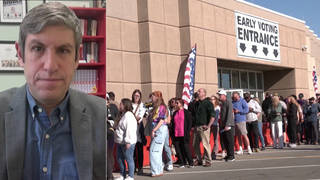
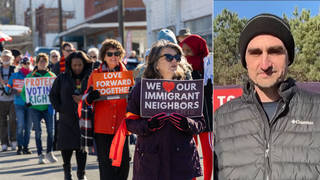
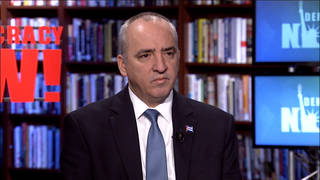
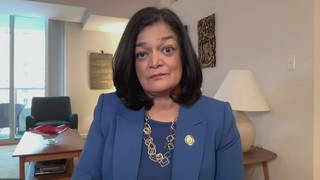





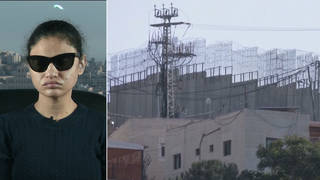

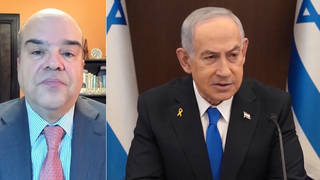
Media Options